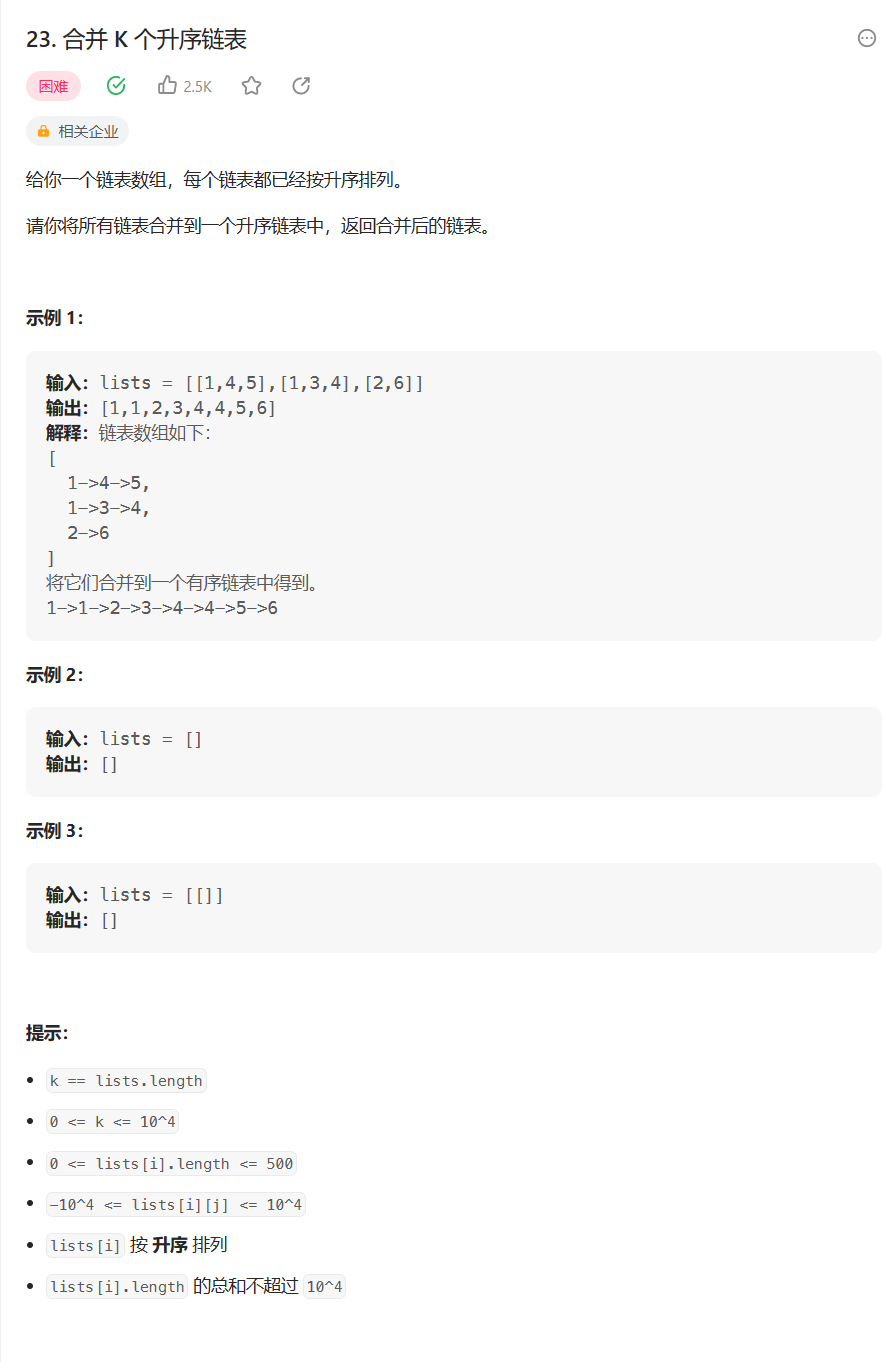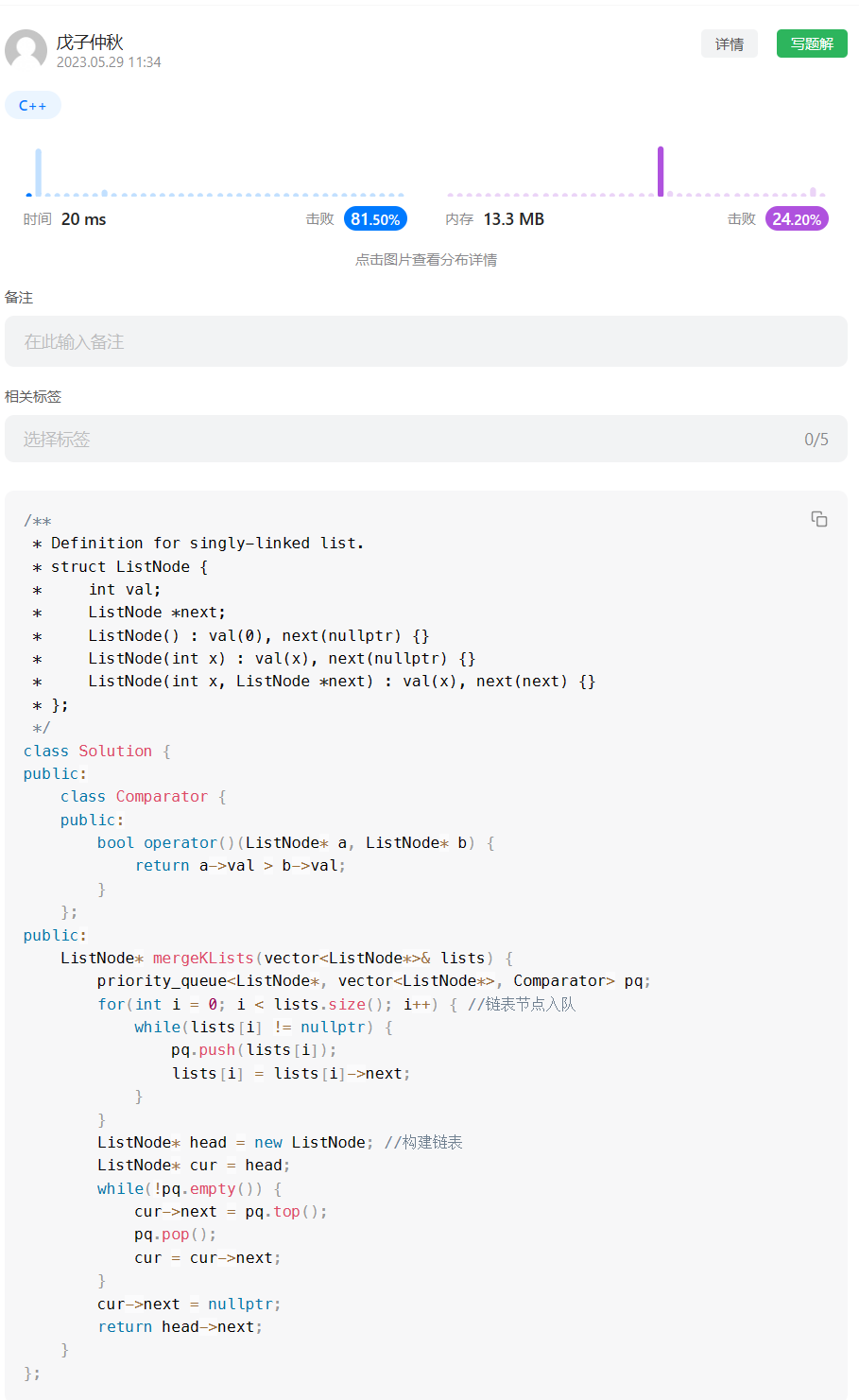您现在的位置是:首页 >技术交流 >【LeetCode】HOT 100(4)网站首页技术交流
【LeetCode】HOT 100(4)
简介【LeetCode】HOT 100(4)
题单介绍:
精选 100 道力扣(LeetCode)上最热门的题目,适合初识算法与数据结构的新手和想要在短时间内高效提升的人,熟练掌握这 100 道题,你就已经具备了在代码世界通行的基本能力。
目录
题目:23. 合并 K 个升序链表 - 力扣(Leetcode)
题目:23. 合并 K 个升序链表 - 力扣(Leetcode)

题目的接口:
/**
* Definition for singly-linked list.
* struct ListNode {
* int val;
* ListNode *next;
* ListNode() : val(0), next(nullptr) {}
* ListNode(int x) : val(x), next(nullptr) {}
* ListNode(int x, ListNode *next) : val(x), next(next) {}
* };
*/
class Solution {
public:
ListNode* mergeKLists(vector<ListNode*>& lists) {
}
};解题思路:
这道困难题并不困难可真是太好了,
算是我人生中自己独自做出来的第一道困难题目了,
我打算介绍两个思路,
一个是我自己做这道题使用的思路,(他没要求复杂度,当然就可以放飞自我啦)
另一个是我在看题解的时候觉得很妙的思路,
思路一:(我的思路)
1. 直接将这个链表数组的值存进一个数组里面
2. 然后sort排序数组
3. 构建一个链表并返回即可
思路很简单,代码:
/**
* Definition for singly-linked list.
* struct ListNode {
* int val;
* ListNode *next;
* ListNode() : val(0), next(nullptr) {}
* ListNode(int x) : val(x), next(nullptr) {}
* ListNode(int x, ListNode *next) : val(x), next(next) {}
* };
*/
class Solution {
public:
ListNode* mergeKLists(vector<ListNode*>& lists) {
vector<int> v; //将链表数组的值存进这个数组
for(int i = 0; i < lists.size(); i++) {
ListNode* cur = lists[i];
while(cur) {
v.push_back(cur->val);
cur = cur->next;
}
}
sort(v.begin(), v.end()); //排序
ListNode* head = new ListNode; //构建链表
ListNode* cur = head;
head->next = nullptr;
for(int i = 0; i < v.size(); i++) {
ListNode* newnode = new ListNode;
cur->next = newnode;
cur = cur->next;
cur->val = v[i];
}
cur->next = nullptr;
return head->next;
}
};那么思路2:
使用优先级队列,维护一个小根堆,
不过链表的比较不能直接支持,
所以我们需要自己重载一个比较方法。
1. 将链表节点入队
2. 取元素构建新链表
代码如下:
代码:
/**
* Definition for singly-linked list.
* struct ListNode {
* int val;
* ListNode *next;
* ListNode() : val(0), next(nullptr) {}
* ListNode(int x) : val(x), next(nullptr) {}
* ListNode(int x, ListNode *next) : val(x), next(next) {}
* };
*/
class Solution {
public:
class Comparator { //重载的比较方法
public:
bool operator()(ListNode* a, ListNode* b) {
return a->val > b->val;
}
};
public:
ListNode* mergeKLists(vector<ListNode*>& lists) {
priority_queue<ListNode*, vector<ListNode*>, Comparator> pq;
for(int i = 0; i < lists.size(); i++) { //链表节点入队
while(lists[i] != nullptr) {
pq.push(lists[i]);
lists[i] = lists[i]->next;
}
}
ListNode* head = new ListNode; //构建链表
ListNode* cur = head;
while(!pq.empty()) {
cur->next = pq.top();
pq.pop();
cur = cur->next;
}
cur->next = nullptr;
return head->next;
}
};过过过过啦!!!!

写在最后:
以上就是本篇文章的内容了,感谢你的阅读。
如果感到有所收获的话可以给博主点一个赞哦。
如果文章内容有遗漏或者错误的地方欢迎私信博主或者在评论区指出~
风语者!平时喜欢研究各种技术,目前在从事后端开发工作,热爱生活、热爱工作。






 U8W/U8W-Mini使用与常见问题解决
U8W/U8W-Mini使用与常见问题解决 QT多线程的5种用法,通过使用线程解决UI主界面的耗时操作代码,防止界面卡死。...
QT多线程的5种用法,通过使用线程解决UI主界面的耗时操作代码,防止界面卡死。... stm32使用HAL库配置串口中断收发数据(保姆级教程)
stm32使用HAL库配置串口中断收发数据(保姆级教程) 分享几个国内免费的ChatGPT镜像网址(亲测有效)
分享几个国内免费的ChatGPT镜像网址(亲测有效) Allegro16.6差分等长设置及走线总结
Allegro16.6差分等长设置及走线总结